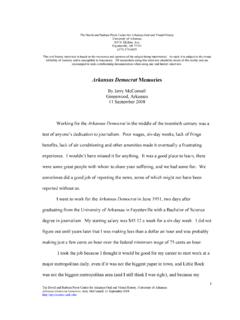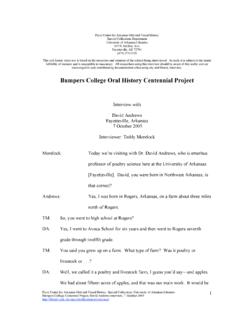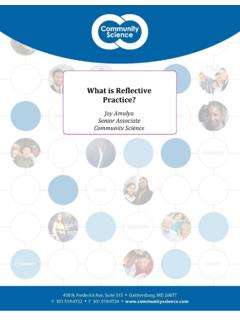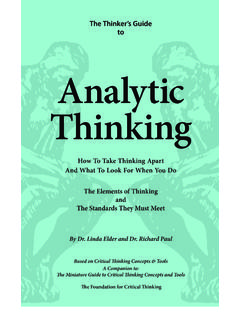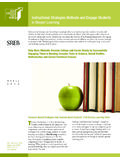Transcription of Diane D. Blair Papers (MC 1632) - Pryor Center for ...
1 Special Collections University of Arkansas Libraries 365 N. McIlroy Avenue Fayetteville, AR 72701-4002 (479) 575-8444 Diane D. Blair Papers (MC 1632 ) 1992 Clinton Presidential Campaign Interviews Interview with Caren A. Wilcox Campaign Position: Deputy Director for Business Outreach Little Rock, Arkansas October 30, 1992 Overview Diane D. Blair was an assistant professor of political science at the University of Arkansas, Fayetteville, when she took a leave of absence to serve as a senior researcher in Governor Bill Clinton s presidential campaign.
2 Approximately one month before the November election, Blair obtained permission from the governor to conduct interviews with participants in the Clinton/Gore campaign. In her own words, .. I had two major purposes in mind: first, simply to preserve for posterity an accomplished campaign organization that would essentially disappear on election day; and second, through discussions with campaign workers from all departments, to see what those on the inside believed to be the key ingredients of the campaign s success. She prepared a list of questions and began interviewing people as schedules allowed.
3 After Blair s death in 2000, her husband, Jim Blair , donated her personal and professional Papers to Special Collections, University of Arkansas Libraries. Caren A. Wilcox reviewed this transcript and granted permission to make this interview available to scholars, students, and researchers. The final document may contain edits requested by the interviewee. This transcript was processed as part of the Diane D. Blair Papers and prepared for publication by the editorial staff of the David and Barbara Pryor Center for Arkansas Oral and Visual History.
4 The Diane D. Blair Papers are housed in Special Collections, University of Arkansas Li-braries, Fayetteville. Permission to republish or quote from this interview must be ob-tained before publication. Please contact Special Collections at (479) 575-8444 or for assistance. A Permission to Publish Request Form may found at Interview with Caren A. Wilcox, October 30, 1992 2 Diane D. Blair Papers (MC 1632 ) Special Collections, University of Arkansas Libraries, Fayetteville [Beginning of Interview] Diane Blair : What were you doing immediately before you joined the campaign?
5 Caren Wilcox: I m on leave of absence from Hershey Foods Corporation where I am the director of government relations. DB: Did you volunteer yourself or did someone reach out and recruit you? CW: I volunteered myself. I ve been volunteering for Governor Clinton since February and had given a fundraiser with a friend for him in Harrisburg when there was no money in Pennsylvania. We raised money before the primary. And I just began to get a sense of what was happening in the business community and that we could make a difference and get a story out if we would just try.
6 And because of my position I was getting all of the Bush propaganda in my office every day, and it became more and more annoying. DB: In this capacity, explain what it is that you do. CW: Okay. Well, Ellis Mottur is the director for business and high tech and he comes from Senator Kennedy s staff. So the two of us have been doing what I would say is sort of the marketing of the business policies that the governor has developed and working with the policy department on making those politically viable in the business community and in the high technology community.
7 And we have been working with a group of volunteers across the country who have gathered up CEOs to endorse Governor Clinton and been having various events with them, including a major event in Chicago in September that he attended, which was a major endorsement meeting in which he met with CEOs from across Interview with Caren A. Wilcox, October 30, 1992 3 Diane D. Blair Papers (MC 1632 ) Special Collections, University of Arkansas Libraries, Fayetteville the country who were supporting him. The real focus of the whole effort has been to get the story out that Governor Clinton does understand business and understands that that s how the economy works and that he s a new kind of Democrat and that a lot of business people understand that and want him to be in the White House.
8 DB: So you would try to get business people to speak up in his behalf because that would be more persuasive to other business people? CW: That s right. And they re expressing confidence in the campaign and in him as an individual and it enhances his credibility. And since the economy is the major issue for the campaign, it s very, very important that key business people be supportive. DB: On a typical day, what would you do? CW: Well, on a typical day I d probably be talking to several states at this point. I mean, in the beginning what we were doing was simply organizing, because it s important to realize that we think that since 1964, there had been no business outreach in a Democratic presidential campaign of this nature.
9 The last time that was done was under President Johnson. So we had a lot of catching up to do. I brought with me lists the campaign had no lists of trade associations, no lists of business associations. DB: And you came when? CW: I think it was August 15. And when I got here we had little pieces of paper and the computer. We didn t have any lists. We didn t have any mailing lists. We didn t have any contact kind of things. I mean, Ellis knew some people in Interview with Caren A. Wilcox, October 30, 1992 4 Diane D. Blair Papers (MC 1632 ) Special Collections, University of Arkansas Libraries, Fayetteville Washington, obviously, having worked there many years, and I knew a lot of people, and we just started constructing our contact list.
10 So we didn t start the way labor does in a Democratic campaign or even the way education does, or somebody else. We started with a completely nontraditional constituency. So the first thing we had to do was get all that refined. And I had to find a volunteer to help us because a lot of it was clerical. A lot of it just was data entry to get the lists so that we would be able to mail to people and communicate with people and fax to people, and so on. DB: When did you get a feeling that maybe you were going to get a critical mass so that you could start to go public?





